Mozambique: Parties confront public prosecutor over annual report
Watch: “One should not marginalise those who have experience” – Guebuza
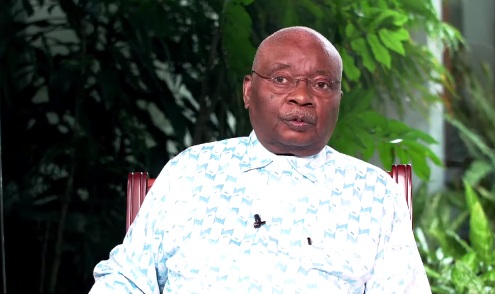
Screen grab: Armando Emílio Guebuza / Facebbok page
- Read the full transcript of Former President Guebuza’s statements, in English and in Portuguese, below the W article.
“One should not marginalize those with experience,” former Mozambican president Armando Guebuza counsels, arguing that the country should harness, regarding the situation in Cabo Delgado, the experience of those who fought in the liberation struggle and in the 16-year civil war, including the opposition.
“It is essential to explore the capacities built up over the years, even those of Renamo [the main opposition force in Mozambique]. They fought [the civil war] for 16 years, are we working with them to find solutions to this problem? I don’t think so,” Armando Guebuza says in a video posted on his Facebook page on Friday (02-10).
According to the former head of state, the country must not “marginalise those who have experience” in strategies to stop the incursions of armed groups in the province.
“For example, we have, in the government, people who participated in the liberation struggle and even made it to [top] officers. Are they being used properly? I think not,” Guebuza adds.
Defence forces assessment
The former Mozambican president concedes that the situation in the province is “complicated”, advocating an assessment of the capabilities of the command of government forces deployed to the region.
“We have our forces there, the police and the Armed Forces, [but] we have to know if the command they have, locally, is in a position to guarantee that peace is produced. Apparently, until now, there are many difficulties,” Guebuza notes, warning also about the suffering of the residents of districts affected by the violence.
Cabo Delgado has been the scene of armed attacks for three years, some claimed by the ‘jihadist’ Islamic State group, but whose perpetrators remain the object of speculation. The violence has caused a humanitarian crisis, with more than a thousand deaths and about 365,000 internally displaced.
The region is the expected destination of around US$50 billion (€42.6 billion) of investment in natural gas in the coming years, with projects led by the North American oil company Exxon Mobil and French Total, which already has work underway in the province.
Transcript
Written on the post: !If we exploit all of our idle capacity, we have the internal conditions to resolve the issue of Cabo Delgado”
“In the case … of the north. In the case of Cabo Delgado. It’s more complicated. Far more complicated.
We have our forces there, the Police and the Armed Forces … We need to know if the command that they have – local, locally – is in a position of ensuring that the peace we want is produced.
Apparently, so far, there are many difficulties. It’s war. That is complicated. Therefore, it is a lot of difficulties.
Also, in the case of the north, the issue is aggravated because the population is moving, from their living environment, to very distant places. An entire work and life cycle of the populations is interrupted. I’m talking about the deaths that happen. It is a grave situation. And I think that the commands should think about it seriously.
But they [the commands] should also back themselves more and more… I have seen people doing studies there, [people] who publish studies on the situation and they are Mozambicans. [The commands] should base themselves more and more on these Mozambicans who are doing these studies. And [should] not marginalise those who have experience in solving this problem.
I will therefore give an example: we have in …, in the Government, people who participated, from the national liberation struggle to today. They made it to [top] officers. Are they being used properly? I do not think so. No. I don’t think so.
Therefore, I think it is essential to use, to explore the capacities installed over the years. Even those from Renamo , they did [fought for] 16 years. Could it be that we are working with them, given that they are together with our Army, to find solutions to these problems?
It does not seem that we are using, at least successfully, that osseous capacity, at a moment as grave as this.”
Transcrição
Escrito no post: “Se explorarmos toda a nossa capacidade ociosa, temos condições internas para resolver a questão de Cabo Delgado”
“No caso .. . do norte. No caso de Cabo Delgado.
É mais complicado.Muitíssimo mais complicado. Nós temos as nossas forças lá, a polícia e as Forças Armadas…
Temos que saber se o comando que elas têm, local localmente, está em condições de garantir que se produza a paz que nós queremos.
Aparentemente, até agora, há muitas dificuldades. É guerra. Isso é complicado. Então é muitas dificuldades
Também, no caso norte, a coisa agrava-se porque a população está-se a deslocar, do seu ambiente de vida, para locais muito distantes. Interrompe-se todo um ciclo de trabalho e vida das populações. Estou a falar das mortes que acontecem. É uma situação grave e eu penso que os comandos deviam pensar seriamente nisso.
Mas deviam também apoiar-se cada vez mais… Eu tenho visto aí pessoas que fazem estudos, que publicam estudos sobre a situação. Apoiar-se cada vez mais. E que são moçambicanos. Apoiar-se cada vez mais nesses moçambicanos que vão fazendo esses estudos . E não deviam marginalizar aqueles que têm experiência para a solução deste problema. Eu darei,portanto, um exemplo: nós temos. em… no Governo, pessoas que participaram, desde a luta de libertação nacional até hoje. Chegaram a oficiais. Será que estão sendo devidamente utilizados?
Eu penso que não. Não. Eu penso que não.
Por isso, eu penso que é fundamental a utilização, a exploração das capacidades instaladas ao longo destes anos todos. Mesmo os da Renamo, fizeram 16 anos. Estaremos a trabalhar com eles, já que estão juntos com o nosso Exército, para encontrar soluções para esses problemas?
Não parece que estejamos a utilizar, pelo menos com sucesso, essa capacidade óssea’, num momento tão grave como este.”


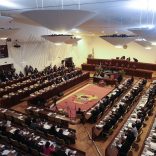
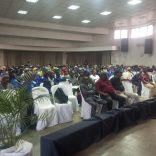
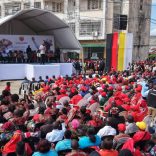

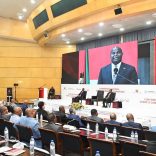
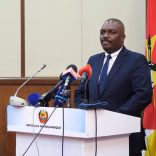





Leave a Reply
Be the First to Comment!
You must be logged in to post a comment.
You must be logged in to post a comment.